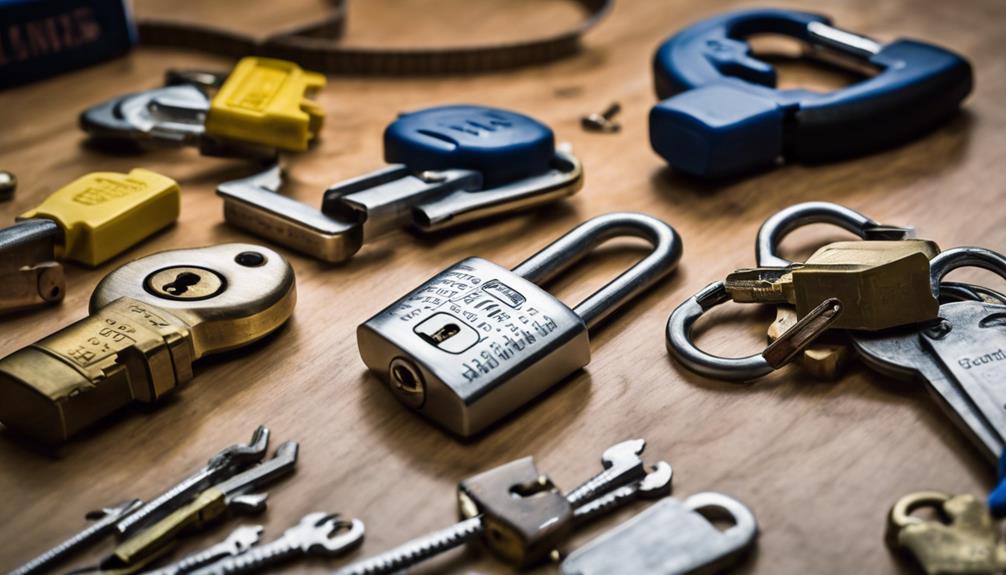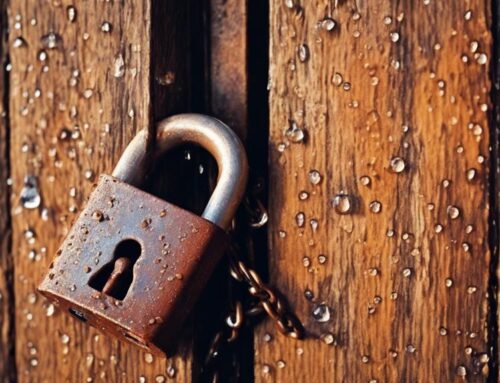Choosing the right lock for your home starts with evaluating your security needs. Consider your lifestyle and local crime rates to determine how secure you need your locks to be. Familiarize yourself with different lock types, like deadbolts and smart locks, and check their security ratings. Don't forget to set a budget and look for brands with reliable reputations and good customer reviews. Aesthetic appeal matters too, as locks should match your home's style. Each decision impacts your security, so keep exploring your options to make the best choice for your home.
Key Takeaways
- Assess your security needs based on lifestyle, neighborhood crime rates, and valuable items to determine the appropriate lock type.
- Choose from various lock types, such as deadbolts for strength, smart locks for convenience, and knob locks for secondary access.
- Evaluate locks based on security ratings and certifications to ensure reliable protection against break-ins.
- Consider your budget while prioritizing essential features that align with your security requirements for long-term investment.
- Research brand reputation and customer reviews to identify trustworthy locks with proven performance and durability.
Assess Your Security Needs
Evaluating your security needs is essential before choosing the right lock for your home. Start by appraising your security needs based on your lifestyle and the specific characteristics of your neighborhood. Consider factors like how often you're away, the crime rate in your area, and whether you have valuable items that require extra protection.
Additionally, be aware of the potential risks associated with installing incompatible locks, as this could compromise your home's security. Familiarize yourself with the risks of installing incompatible locks to guarantee that you make the right choice.
Next, familiarize yourself with lock security levels. Not all locks offer the same protection, and understanding which level suits your needs can make a significant difference. A home lock guide can help clarify which locks provide better resistance against forced entry, picking, and bumping.
Think about the entry points that need securing. While front doors often need the highest level of security, don't overlook side doors, back doors, and windows. Each area may require a different type of lock or security measure.
This thoughtful approach not only enhances your safety but also provides peace of mind for you and your loved ones. By carefully evaluating your security needs and knowing the lock security levels, you're better equipped to make an informed decision that serves your home's safety.
Understand Lock Types
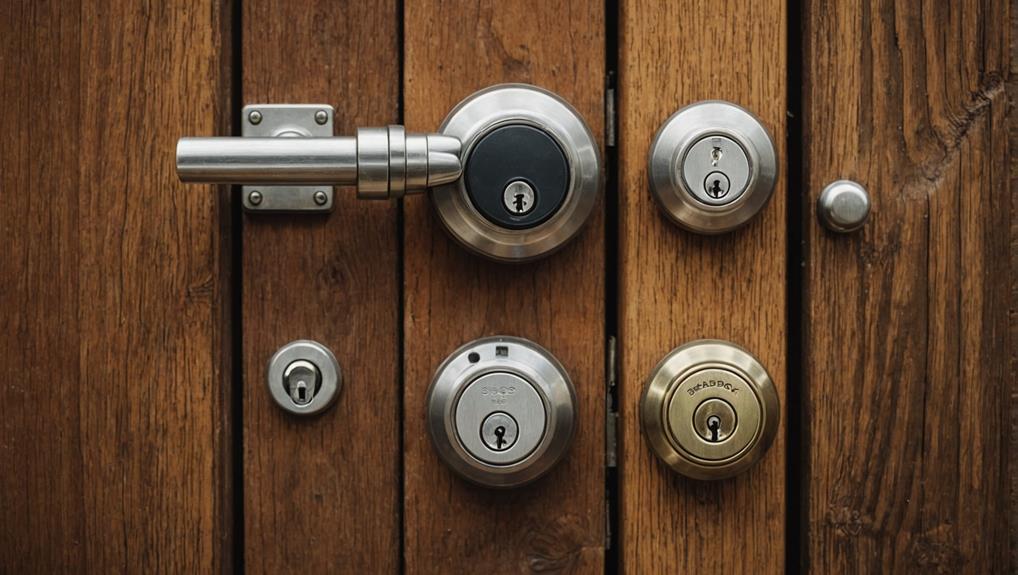
Once you've assessed your security needs, it's time to explore the different types of locks available. Understanding these residential lock types can help you make informed decisions when selecting the best locks for your home. For instance, contemplate the lock replacement options available for various entry points in your home to enhance security.
Start with deadbolts, known for their strength and resistance to picking. They're a popular choice for front doors.
Then, contemplate knob locks, which are simple but less secure on their own. For added security, you might opt for a smart lock, allowing keyless entry and remote access, perfect for those who frequently serve others or need to grant access to guests.
Don't overlook padlocks, which can secure gates or storage sheds. When evaluating options, think about your lifestyle and how you want to balance convenience with security.
As you navigate lock buying tips, remember to contemplate weather resistance if you're in a harsher climate, ensuring longevity.
Ultimately, the right lock will align with your security goals while serving the needs of your household and visitors. Take your time and choose wisely, as the right lock can provide peace of mind for you and those you care for.
Evaluate Security Ratings
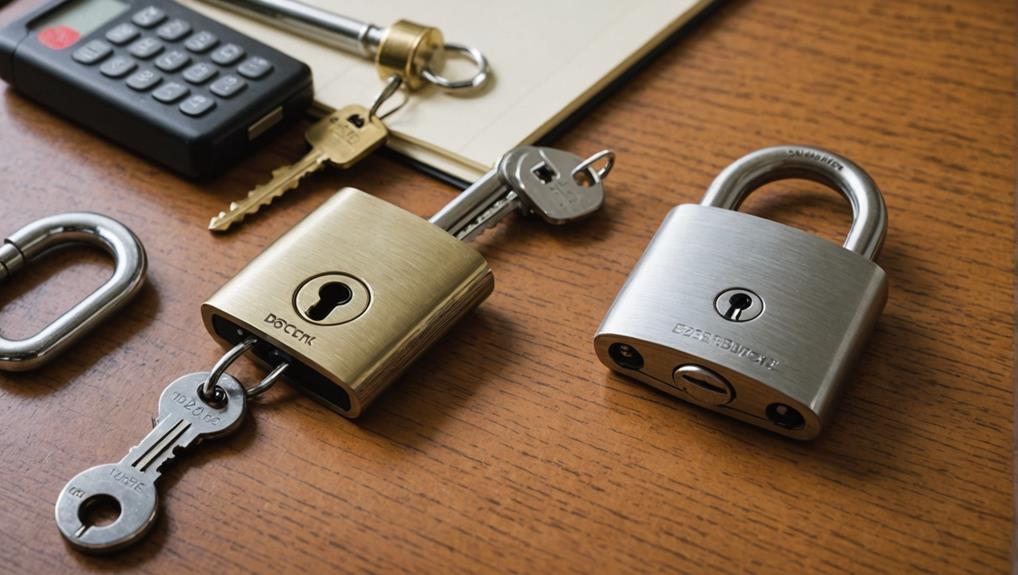
When choosing a lock, understanding security ratings is essential for your home's safety. High-security locks offer enhanced protection features, such as drill resistance and key control, which make them more reliable than standard locks.
You'll want to compare lock types and see how their ratings stack up against each other. Additionally, checking for certification standards can help guarantee you're making a wise investment.
For instance, you might consider locks that meet stringent security standards to further bolster your home's defenses.
Understand Security Ratings
Understanding security ratings is essential for choosing the right lock for your home, as they provide insight into how well a lock can withstand various types of attacks. Security ratings typically come from independent testing organizations that evaluate locks based on criteria such as resistance to picking, drilling, and forced entry. By familiarizing yourself with these ratings, you can make informed decisions that protect your loved ones and belongings.
When you're searching for affordable home locks, don't compromise on quality. Look for locks that have high security ratings, as these will offer better protection and peace of mind. For instance, a lock with a Grade 1 rating is considered the highest level of residential security, while Grade 2 and Grade 3 provide varying degrees of protection.
Additionally, consider the lock's materials and construction. A sturdy deadbolt made of solid metal is often a safer choice than a standard knob lock.
Compare Lock Types
Comparing different lock types helps you assess their security features and determine which best meets your needs. When you explore lock options, consider deadbolts, smart locks, and knob locks.
Deadbolts are typically more secure, as they require a key to open, making unauthorized entry difficult. Smart locks offer convenience with keyless entry and can be controlled remotely, but verify they've a solid security rating. Knob locks, while easy to use, often provide less security and are best paired with deadbolts for added protection.
As you think about lock installation, remember that the right choice depends on your home's specific vulnerabilities and your lifestyle. For example, if you frequently have guests or service providers, smart locks might be the way to go. On the other hand, if you prioritize traditional security, a sturdy deadbolt could be your best bet.
Ultimately, knowing how to choose locks involves evaluating their security ratings and features against your unique needs. By comparing these types, you're better prepared to safeguard your home and those you care about.
Check Certification Standards
After narrowing down your options, it's important to check the certification standards that validate the security of the locks you're considering. This guarantees that the locks not only meet industry requirements but also provide the protection your home deserves. Look for locks that have been tested and certified by reputable organizations.
Here's a quick reference table to help you understand the key security ratings:
| Certification Body | Rating Description | Recommended For |
|---|---|---|
| ANSI | Grades 1, 2, 3 | High-security needs |
| BHMA | Various levels of security | Residential & commercial |
| UL | Fire safety & security tests | Special conditions |
When you choose locks with recognized certifications, you're investing in peace of mind for yourself, your family, and your community. These standards guarantee that the locks resist picking, drilling, and other common break-in methods. Always prioritize these certifications, as they reflect the lock's reliability and effectiveness. By doing so, you're not only safeguarding your home but also contributing to a safer neighborhood for everyone.
Consider Your Budget
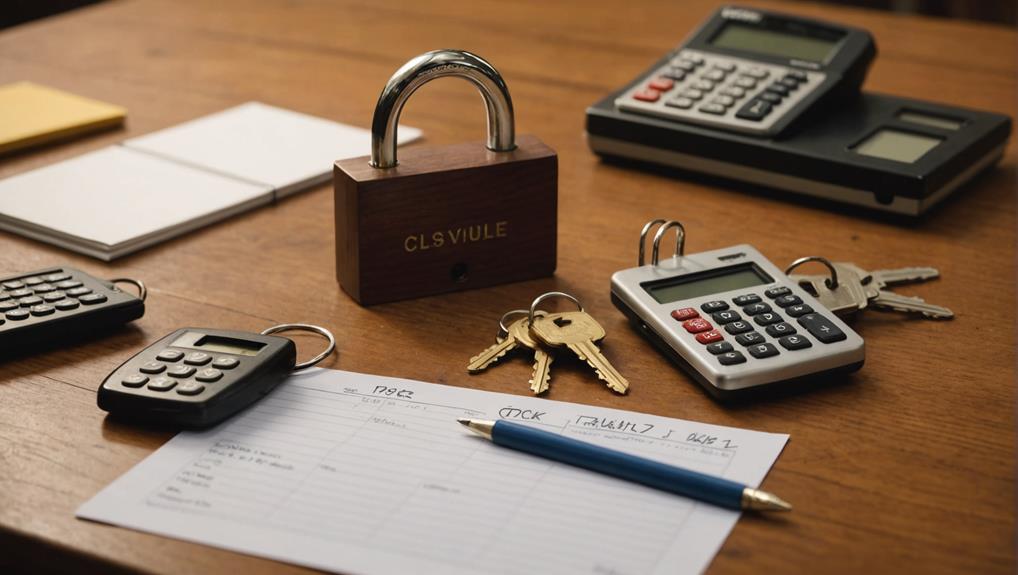
When you're choosing a lock for your home, it's vital to contemplate your budget right from the start. Balancing security needs with financial constraints is essential, especially when there are various options available.
Understanding lock replacement costs can help you make an informed decision. You want to guarantee that you're getting the best value for your money without compromising on safety.
Here are a few tips to help you stay within budget while finding the right lock:
- Research Prices: Explore different brands and models to understand the price range for high-quality locks.
- Prioritize Features: Identify which features are most important to you, like keyless entry or smart technology, and focus on those.
- Consider Long-Term Investments: Sometimes, spending a bit more upfront can save you money in the long run due to durability or lower insurance premiums.
- Look for Discounts: Keep an eye out for sales or bundled deals, especially during home improvement seasons.
Check Installation Requirements
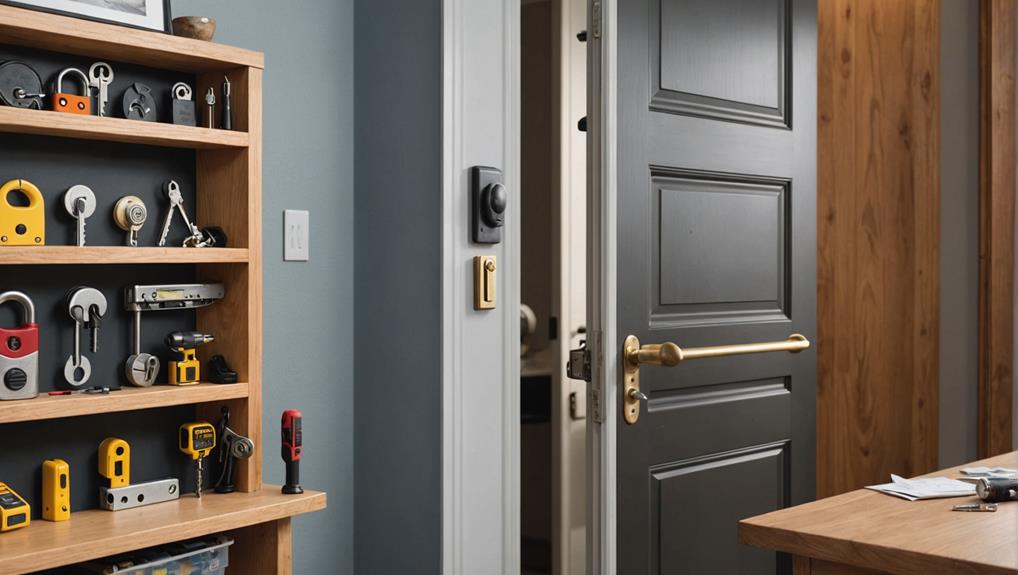
Before diving into your lock selection, it's important to check the installation requirements. Different types of locks come with varying installation needs, and ensuring compatibility with your doors is vital for security and convenience.
Measure the thickness of your door and the size of the existing cutout to determine what type of lock will fit. If you're evaluating an electronic lock, you might want to look into keypad lock replacement as it can offer advanced security features.
You also want to reflect on whether you're comfortable with a DIY installation or if you'd prefer to hire a professional. Some locks are straightforward to install, while others may require specialized tools or skills.
If you choose to go the DIY route, be sure to follow the manufacturer's instructions carefully, as mistakes can compromise the lock's effectiveness.
Additionally, think about any specific door materials, like wood, metal, or fiberglass, as this can affect your choice. For instance, some locks work better with certain materials than others.
Look for Smart Features
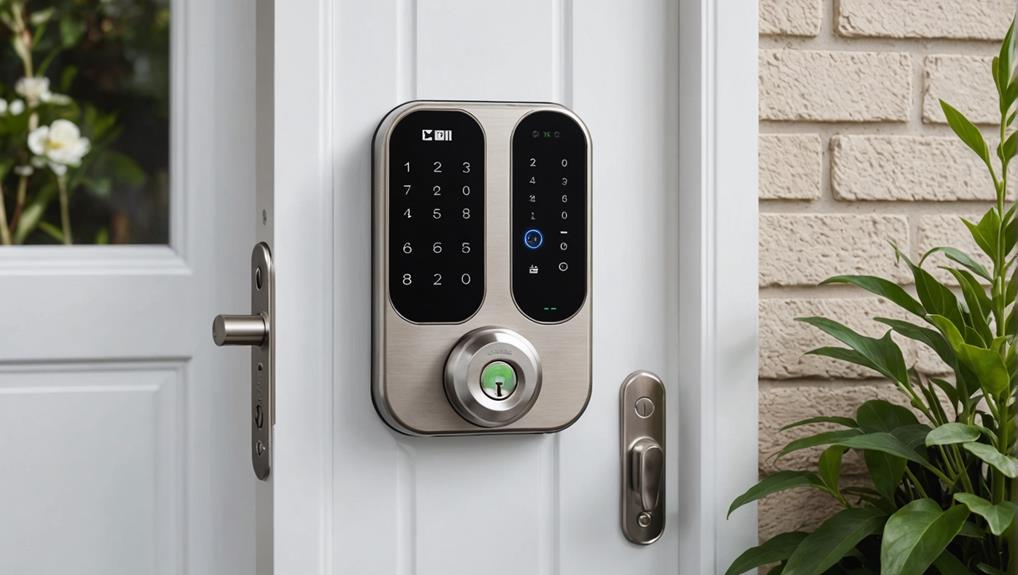
As you explore your lock options, consider looking for smart features that enhance security and convenience.
Smart locks not only protect your home but also simplify your life, allowing you to serve others more effectively. They offer various advantages, such as improved access management and increased security measures, which can be essential for modern living the benefits and drawbacks of smart locks.
With the right technology, you can manage access for family, friends, or service providers without compromising safety.
Here are some smart features to look for:
- Remote Access: Control your lock from anywhere using a smartphone app, granting access to trusted individuals even when you're not home.
- Keyless Entry: Eliminate the need for physical keys, making it easier for everyone to come and go without the risk of losing keys.
- Activity Logs: Monitor who enters and exits your home, giving you peace of mind and ensuring you know who's coming over.
- Integration with Smart Home Systems: Choose locks that seamlessly connect with your existing smart home devices, allowing for enhanced automation and security.
Research Brand Reputation
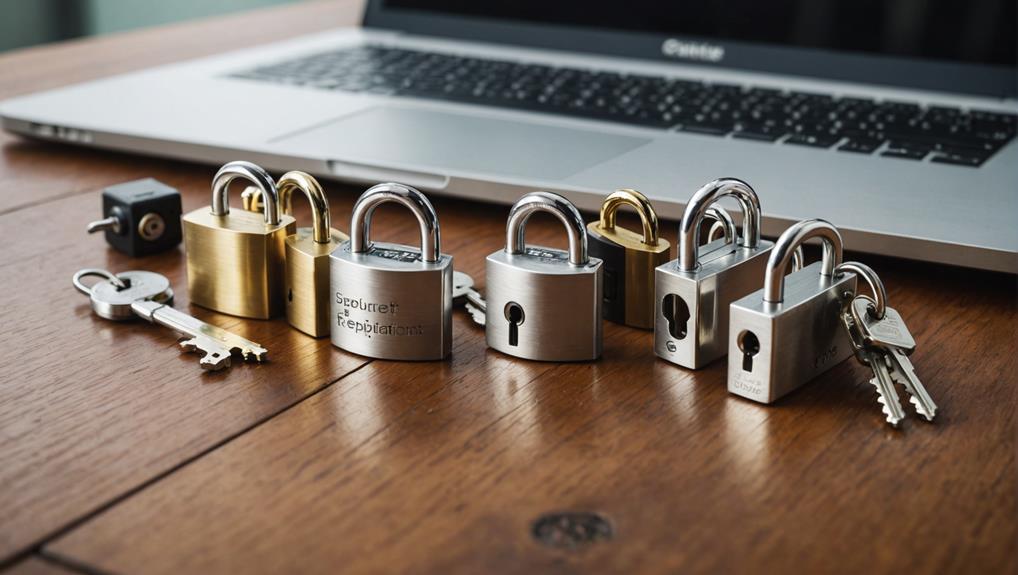
Researching brand reputation is essential when selecting a lock for your home. A reputable brand often reflects a commitment to quality and security, which is vital for protecting your loved ones and valuables. Investing in high-quality locks can provide peace of mind, as they're typically designed to withstand attempted break-ins and offer better durability compared to cheaper alternatives investing in quality locks.
Start by identifying well-known brands in the lock industry. These companies typically have a history of reliability and innovation, and they often invest in rigorous testing and certification processes.
Next, consider how long the brand has been in the market. Longevity can indicate trustworthiness, as established brands usually have a proven track record.
Additionally, look for brands that offer warranties or guarantees. This shows they stand behind their products and are confident in their durability.
You should also evaluate any certifications the brand may have received. Certifications from recognized organizations can further assure you of the lock's effectiveness and security standards.
Read Customer Reviews
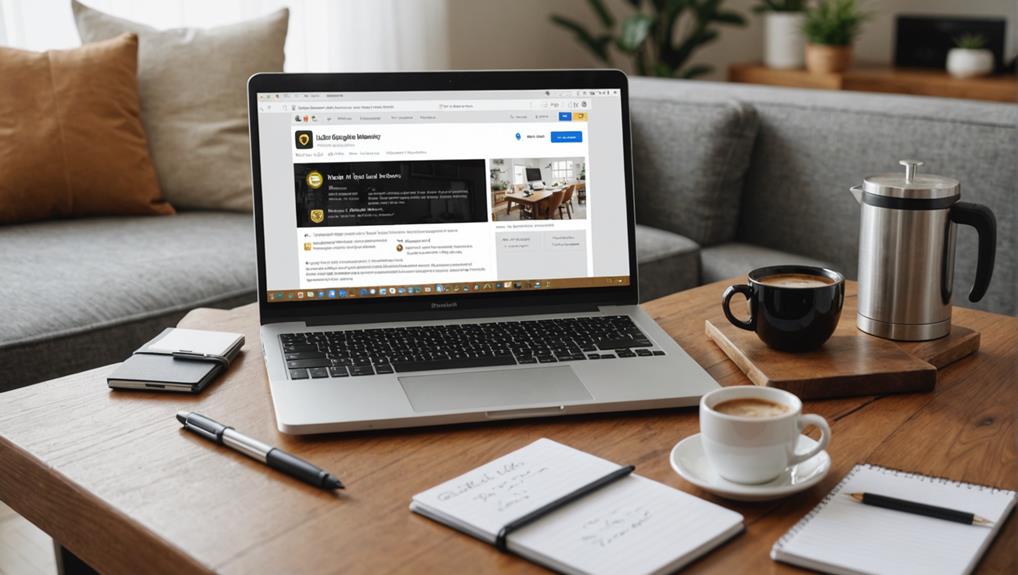
When choosing a lock, reading customer reviews can give you valuable insights.
You'll find trustworthy sources that highlight the pros and cons of various options, helping you make an informed decision.
Additionally, be cautious of overly cheap locksmith services, as they might compromise quality and security; the hidden dangers of these services can lead to more issues down the line.
Plus, comparing different experiences can reveal potential issues you mightn't have considered.
Importance of Trustworthy Sources
Many homeowners underestimate the power of customer reviews when choosing a lock.
Reading what others have experienced can be a game changer. Trustworthy sources can provide insights that help you make informed decisions and guarantee you're selecting a lock that truly meets your needs.
Here's why you should pay attention:
- Real Experiences: Customers share their firsthand experiences, helping you understand how a lock performs in everyday situations.
- Common Issues: Reviews often highlight any recurring problems, allowing you to avoid potential pitfalls.
- Quality Insights: You'll get a sense of the lock's durability and whether it can withstand the test of time.
- Installation Tips: Many reviewers offer advice on installation, which can save you time and frustration.
Evaluating Pros and Cons
Customer reviews are invaluable tools for evaluating the pros and cons of different locks. When you read what others have experienced, you gain insights that can help you make a more informed choice. Here's a simple breakdown of what you might find in customer feedback:
| Pros | Cons |
|---|---|
| Enhanced security | Higher price point |
| Easy installation | May require maintenance |
| Variety of styles | Compatibility issues |
By examining both the positives and negatives, you can better understand which lock aligns with your needs. Look for trends in reviews—if multiple customers mention a specific issue, it's worth considering.
Don't just focus on ratings; explore the details. A lock might have a high rating but could have drawbacks that affect your experience. By listening to the voices of others, you not only empower yourself but also serve your community by sharing your own insights once you've made your choice. In the end, thoughtful evaluation will lead you to a lock that not only protects your home but also brings peace of mind.
Comparing Different Experiences
Diving into customer reviews can reveal a wealth of experiences that help you compare different locks. By reading what others have to say, you'll gain insights that can guide your decision-making process. Customers often share their firsthand experiences, highlighting aspects that may not be evident from product descriptions alone.
Here are some key points you might find in these reviews:
- Durability: Users often comment on how well a lock stands up to daily wear and tear.
- Ease of Installation: Many reviews mention whether a lock is user-friendly for DIY installation or requires professional help.
- Security Features: Look for feedback on how effective the lock is in deterring break-ins or unauthorized access.
- Customer Support: Some reviews discuss the quality of customer service provided by the manufacturer, which can be essential if issues arise.
Think About Aesthetics
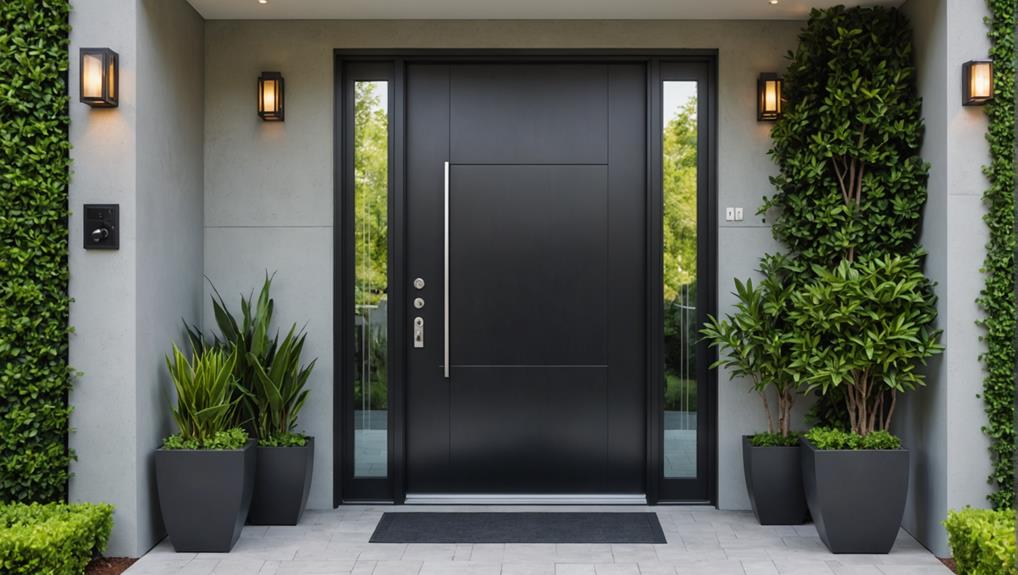
When choosing a lock for your home, don't overlook the importance of aesthetics. Your locks should complement your home's style and enhance its overall appearance. After all, a beautiful home deserves beautiful security features. Consider how the lock's finish, shape, and design fit into the larger picture of your home's exterior.
To help you visualize your choices, here's a quick comparison of popular lock styles:
| Style | Description |
|---|---|
| Traditional | Classic designs with ornate details, perfect for vintage homes. |
| Modern | Sleek, minimalist designs that suit contemporary spaces. |
| Rustic | Textured finishes and earthy tones that blend with nature. |
As you think about your lock options, remember that a well-chosen lock can elevate your entryway. Whether you prefer a traditional look or something more modern, your choice can reflect your personality and serve your guests well. By prioritizing aesthetics, you not only enhance your home's security but also create an inviting atmosphere for everyone who visits.
Frequently Asked Questions
How Often Should I Replace the Locks in My Home?
You should replace your locks every few years, or sooner if you've experienced a break-in or lost your keys.
Regularly checking your locks for wear and tear is crucial, too. If they're difficult to operate or show signs of rust, it's time for a change.
Keeping your home secure protects not just you but also your loved ones.
Stay proactive and guarantee your locks are always in top condition for peace of mind.
Can I Use the Same Key for All Locks?
Think of your keys as a master key to a symphony; they should harmonize with your locks.
While it's possible to have all locks keyed alike, it requires careful planning and installation. You can ask a locksmith to create a system where one key operates multiple locks, ensuring convenience and peace of mind.
Just remember, this approach balances security and ease, so choose wisely to serve both your needs and those of others.
What Should I Do if I Lose My Keys?
If you lose your keys, don't panic! First, retrace your steps to see if they might turn up.
If they're still missing, consider calling a locksmith to help you regain access. It's also wise to change your locks if you think your keys might've fallen into the wrong hands.
Additionally, think about getting a spare key made for future emergencies. Staying prepared can save you from stress later on!
Are There Locks Specifically Designed for Rental Properties?
When it comes to rental properties, you'll find locks specifically designed for easy installation and security.
Picture a sturdy deadbolt that clicks confidently into place, offering peace of mind for both you and your tenants. These locks often feature keyless entry options, making access a breeze.
As you serve others by ensuring their safety, consider locks that allow for quick rekeying, so you can adapt to new tenants without hassle.
How Can I Improve Security Without Replacing Locks?
You can enhance security without replacing locks by adding security cameras, motion-sensor lights, or a good quality doorbell camera.
Reinforcing your doors with strike plates or deadbolts can also make a difference. Consider using door jammers or security bars for extra protection.
Additionally, guarantee your windows are secure with locks or security film.
It's all about creating a more secure environment while keeping those you care about safe and protected.
Conclusion
Choosing the right lock for your home is vital for your peace of mind and security. Did you know that homes without a deadbolt are 85% more likely to be broken into? By evaluating your security needs, understanding lock types, and considering smart features, you can greatly enhance your home's safety. Don't forget to check installation requirements and brand reputation. With the right lock, you can protect your loved ones and valuables effectively while keeping your home stylish.

